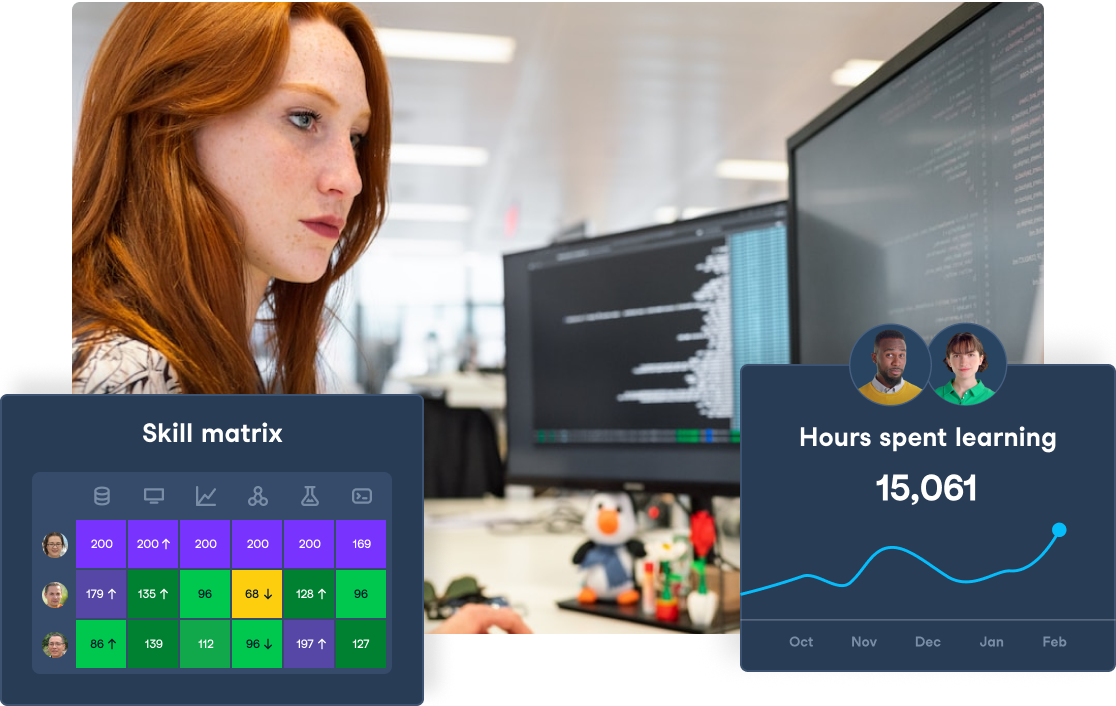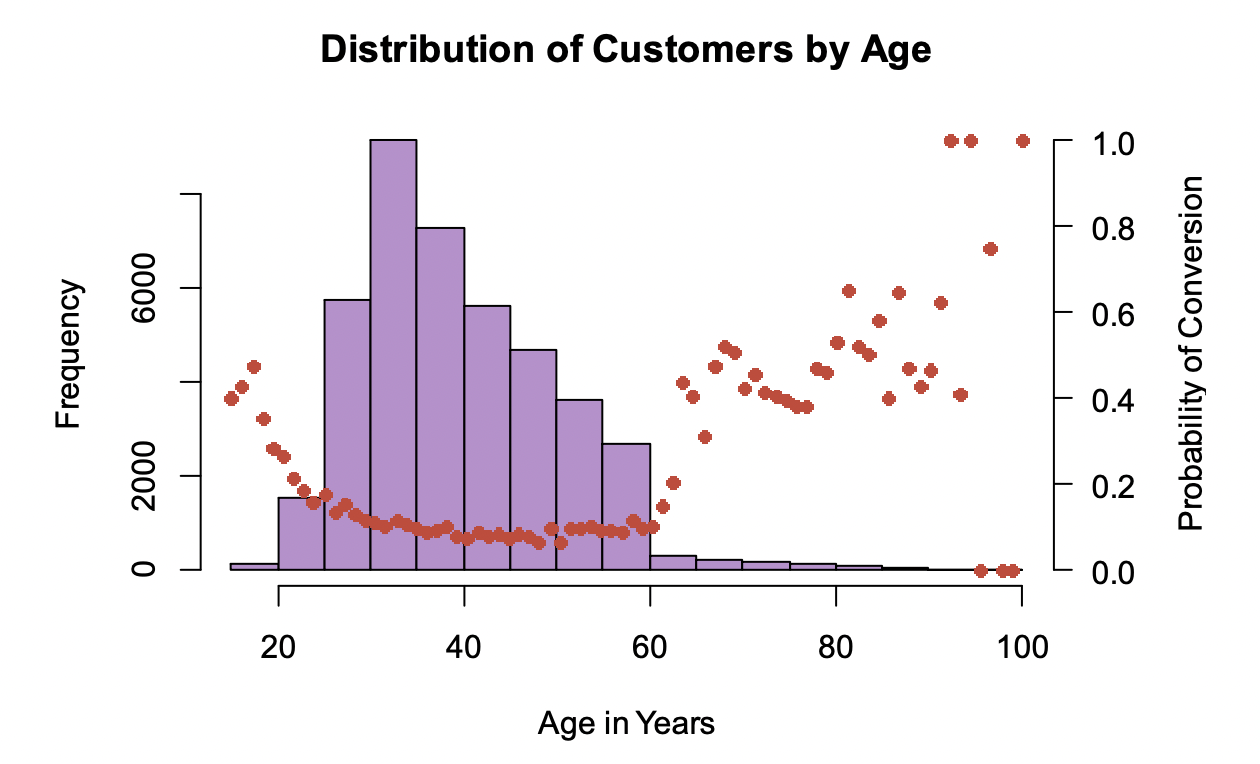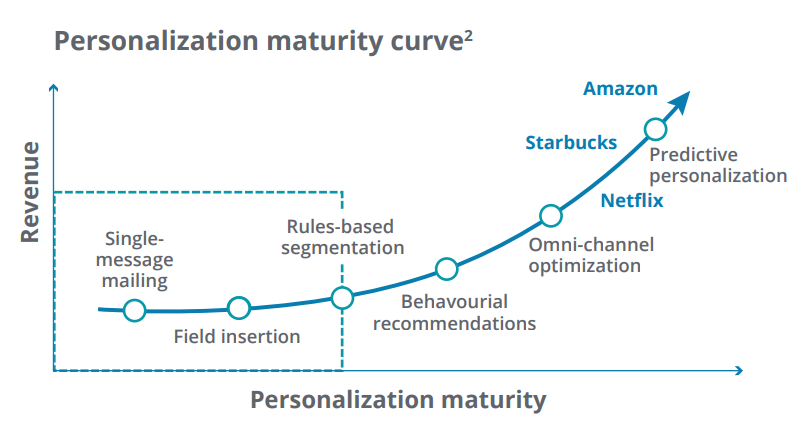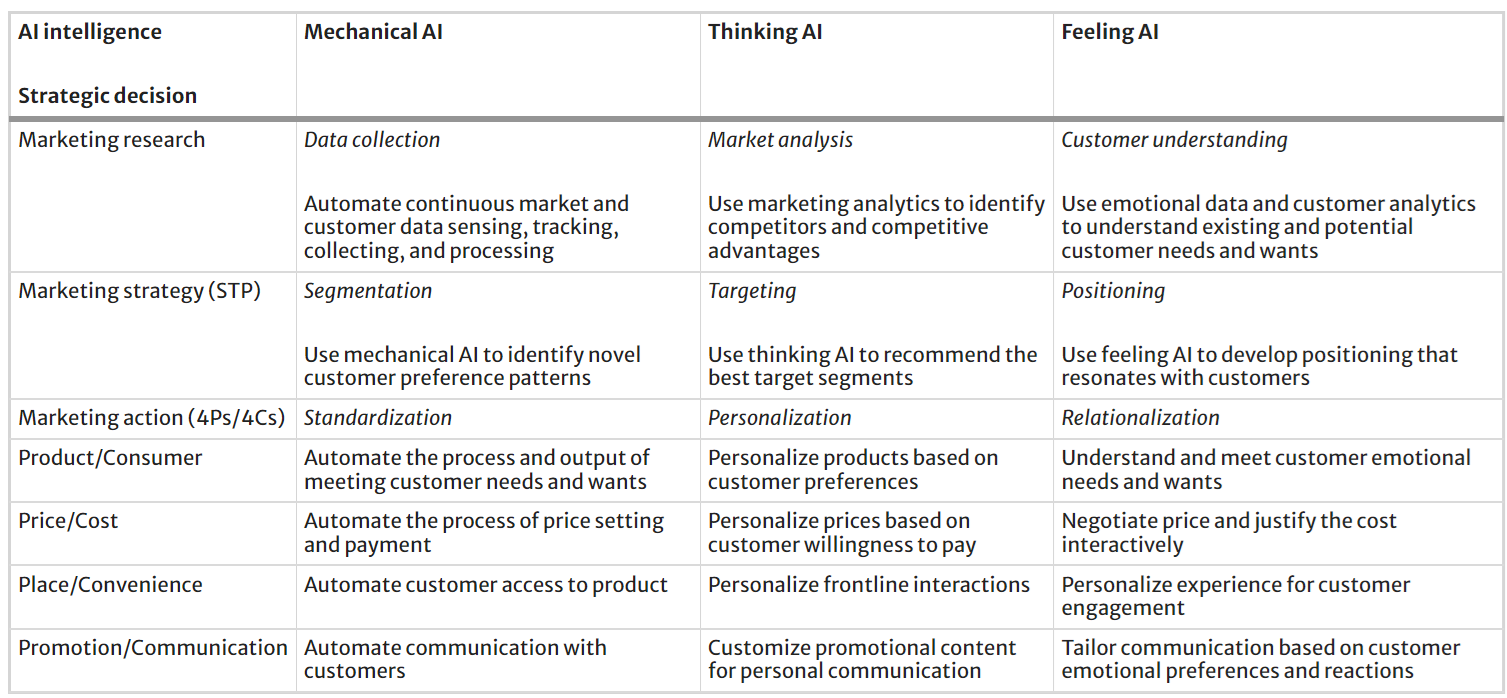Track
Among the many applications artificial intelligence (AI) provides, marketing has arguably the most potential. With over 60 uses of generative AI mentioned in a McKinsey analysis belonging to marketing, it's no wonder that this field stands to gain significantly from AI.
In this guide, we'll explore how AI is revolutionizing marketing and provide real-world examples to showcase its impact. You should also check out our webinar, What Leaders Need to Know About Implementing AI Responsibly.
Elevate Your Organization's AI Skills
Transform your business by empowering your teams with advanced AI skills through DataCamp for Business. Achieve better insights and efficiency.

What is AI in Marketing?
Artificial intelligence in marketing refers to using machine learning algorithms and advanced data analytics to optimize and automate marketing operations. This technology enables marketers to make data-driven decisions, predict customer behavior, and deliver personalized experiences at scale.
AI-powered marketing tools can analyze vast amounts of data in real time, identifying patterns and trends that humans might overlook. This capability allows marketers to gain deeper insights into their target audience, create more effective campaigns, and ultimately drive better results.
Applications of AI in Marketing
The uses of AI tools in marketing are vast, and we’re only just scratching the surface of what’s to come. Here are some ways that organizations are already implementing AI in marketing:
1. Enhancing customer targeting and segmentation
AI has changed the way marketers approach customer targeting and segmentation. Traditional segmentation methods often rely on broad demographic categories, which can be limiting and may not accurately reflect individual customer preferences.
With AI, marketers can create more nuanced and accurate customer segments based on a wider range of data points. These can include behavioral data, purchase history, browsing patterns, and even social media activity.
AI customer segmentation models can analyze these complex data sets to identify patterns and trends that would be difficult or impossible for humans to detect.
This advanced segmentation allows marketers to create highly targeted campaigns that speak directly to the needs and interests of specific customer groups.
2. Optimizing ad spend and performance
Another area where AI is making a significant impact is in advertising optimization. AI-powered tools can analyze vast amounts of real-time data to identify the most effective ad placements, timing, and creative elements for each campaign.
These tools can automatically adjust bid strategies, allocate a budget to the best-performing channels, and even generate ad copy variations to improve performance.
In a case study by Accenture, a top US retailer had an estimated saving of $300 million in media buying opportunities due to their implementation of an AI model to optimize media spend.
3. Streamlining content creation and curation
Content creation is a crucial aspect of any marketing strategy, but it can also be time-consuming and resource-intensive. AI is changing this by automating many aspects of the content creation process, from generating ideas to writing and optimizing content.
AI-powered content tools can analyze trending topics, competitor content, and user engagement data to suggest relevant content ideas that are likely to resonate with your audience.
For example, Hubspot has a blog ideas generator that can help marketers get a headstart when content generation becomes tedious.
Some advanced AI writing tools can even generate draft content based on specific parameters, which can then be refined and polished by human writers.
Image generators like ChatGPT can also help with creating images with specific graphics that resonate with your customers. For example, Singapore's Ministry of Finance published a series of images on X to share information on support schemes. Although the images are far from realistic, they help the marketing team speed up content generation for fast-paced social media platforms.
In addition to creation, AI can also help with content curation by automatically identifying and recommending relevant content from various sources. This can be particularly useful for social media marketing, where staying on top of trending topics and sharing timely content is crucial.
4. Improving customer service with AI-powered chatbots
Customer service is a critical component of any well-rounded marketing and brand strategy. It is a key touchpoint with your customers and has a huge potential to help your brand stand out from the competition.
AI-powered chatbots are now being used by many companies for their instant, 24/7 support to customers across various channels.
Powered by neural networks or large language models, these chatbots can handle a wide range of customer inquiries, from simple FAQs to more complex product recommendations. With an AI model that's trained according to your customer profile, it can also learn and improve over time, becoming more effective at understanding and responding to customer needs.
5. Predictive analytics
One of the most powerful applications of machine learning in marketing is predictive analytics. Machine learning models typically analyze historical data and identify patterns to make accurate predictions about future trends, such as churn rate or customer conversion probability based on demographics.
For example, in this white paper on predictive analytics in retail banking, you can see the probability of conversion decreases with age up to the age of 40.

Marketers can use these predictions to make more informed decisions about everything from product development to campaign strategy.
For example, AI can predict which customers are most likely to churn, allowing marketers to proactively engage these at-risk customers with targeted retention campaigns.
Predictive analytics can also help marketers forecast demand for products or services, optimize pricing strategies, and identify emerging market trends before they become mainstream. This forward-looking approach enables marketers to stay ahead of the curve and make proactive decisions that drive business growth.
For a good entry-level introduction to this topic, our Machine Learning for Marketing in Python course is one way you can get started.
Benefits of Using AI in Marketing
As explained above, the use of AI can bring multiple benefits to your organization.
1. Efficiency and productivity
Routine tasks and streamlining complex processes can be automated; AI can help marketers save time and resources. This allows them to focus on higher-value activities such as strategy development and creative thinking.
For example, if a marketer needs to create multiple variations of an email campaign, AI can automate this process by generating personalized content and subject lines based on customer data. This saves time and resources while also delivering a more personalized experience for customers.
The email copy can be rephrased to determine what type of tone and style suits the customers more. This can potentially save on the productivity of the marketing team.
2. Personalization at scale
4 out of 5 marketers today include personalization in their email marketing campaigns. With the use of AI-powered marketing tools, marketing teams can create more personalized experiences for individual customers at scale.
With the use of AI chatbots, marketing teams can gather information on customer behavior and needs at a much larger scale.
These customer preferences, needs, and behaviors can be recorded and incorporated into highly targeted messages that resonate with each individual.
For example, the personalization of experiences can be matured according to predictive hyper-personalization.

3. Better decision-making
With AI providing deeper insights into customer behavior and campaign performance, marketers can make more informed decisions about their strategies. These data-driven decisions are likely to lead to better results compared to relying on intuition or limited data.
4. Improved ROI
AI can help marketers achieve a better return on their marketing investment by optimizing ad spend and targeting the right customers with personalized messages. This is especially valuable for small businesses and startups with limited budgets.
How to Implement AI in Your Marketing Strategy
Step 1: Conducting a needs assessment
Firstly, when using AI in your marketing strategy, you'll have to look into the areas that actually need work. This could involve identifying pain points in your current processes, areas where you want to improve, and goals you hope to achieve with AI.
Here are some guiding questions to help identify these areas:
- Are there any repetitive tasks that are consuming a lot of time and resources?
- Is personalization at scale necessary for your business?
- Do you have access to large amounts of customer data but struggle to make sense of it?
- Are there areas in your marketing strategy that could benefit from predictive analytics?
- Will implementing AI be worth the investment of resources?
With these questions, see if your business needs align with the potential benefits of AI in marketing. Remember, AI has to blend into your workflows instead of creating new roadblocks.
If all the boxes are ticked, move on to the next step.
Step 2: Selecting the right AI tools and platforms
Once you have a clear understanding of your needs, you can start looking at the tools available that suit your requirements exactly.
Take some time to research and evaluate different AI tools and platforms that align with your goals. Here are some factors to consider in your evaluation:
- Cost: Determine your budget for implementing AI and compare it with the pricing of different tools.
- Features: Look into the specific features of each tool and how they align with your needs.
- User-friendliness: A user-friendly platform that your team can ease adoption in your team without extensive training.
- Integration: If you already use other marketing tools, make sure the AI platform can seamlessly integrate with them to avoid disruptions in workflow.
- AI accuracy: Look into the accuracy of AI predictions for each tool through customer reviews or through a free trial
As mentioned above, any AI tools you choose should complement your existing marketing stack well.
For example, when using AI for content creation, look for tools that can easily integrate with your content management system and social media platforms. Some AI content generators allow one-click imports of AI drafts into WordPress directly.
Here's a tip for marketers adopting new AI tools:
Go for tools that are accurate, yet user-friendly. This makes a large difference in the speed of adoption by your team. Not having the perfect first tool is normal. Try to take advantage of trial periods and gather feedback from your team on their effectiveness too.
The AI tools market is moving so quickly, with many new tools are being launched, so you wouldn't be sticking to one tool for long.
One common tool used in building AI models is Python, through the use of common AI frameworks like TensorFlow and PyTorch. These frameworks provide a foundation for developing and training AI models, as well as deploying them in various environments.
You and your team can begin learning about this in our skill track on Marketing Analytics with Python.
Step 3: Training and upskilling your team
For effective integration of AI, your marketing team needs to stay ahead of these new tools to properly leverage AI. Your team will require more training on these new tools.
“AI Will Make Us More Human, Not Less”—Satya Nadella, CEO of Microsoft
With proper training for the use of AI by humans, your marketing team's efforts will be boosted, not replaced.
Developing your marketing team to be AI-ready can be either training existing staff on how to use AI tools and platforms or hiring new staff with AI expertise.
That’s where DataCamp For Business can help. We have some great resources for upskilling your workforce in Al, like this AI Business Fundamentals skill track. DataCamp also offers customized learning paths for employees at your organization so that they can quickly learn the skills that are relevant to them.
Training 2 or more people? Check out our Business solutions
Get your team access to the full DataCamp library, with centralized reporting, assignments, projects and more

Step 4: Implementation and testing
Once you have selected the right tools, prepared your team, and defined implementation plans, it's time to put AI into action.
Start with small tests and trials before fully incorporating AI into your marketing strategy. This will help you identify any potential issues and fine-tune the process before scaling up.
However, your strategy does not require you to follow all these steps. Instead, you should try to craft a plan based on one that would best fit your team.
To help you get a better picture of how else you can craft such a plan, try out the strategic framework for AI in marketing shown in this white paper.

The Future of AI in Marketing
The future of AI in marketing is exciting, and we expect AI to continue maturing with time.
We're likely to see even more sophisticated applications of AI in areas like voice search optimization, influencer marketing, and hyper-personalized customer experiences.
One exciting area of development is the use of AI in emotional analysis. Advanced AI algorithms may soon be able to analyze facial expressions, voice tone, and even physiological responses to determine emotional states. This could allow marketers to create even more targeted and effective campaigns that resonate with their audience on an emotional level.
Another trend to watch is the integration of AI with other emerging technologies like blockchain and the Internet of Things (IoT). These combinations could lead to new possibilities in areas like real-time marketing based on IoT device data.
Final Thoughts
AI is undoubtedly changing the marketing landscape, and businesses need to stay informed and adapt accordingly.
But remember, AI should not replace human creativity and empathy in marketing; rather, it should be seen as a powerful tool that complements these skills. Looking for a good way to get your marketing team onboard with AI tools? Try our Implementing AI Solutions in Business course to get started.
Need to boost your team or business with world-class data and AI skills? Our DataCamp for Business plan is the perfect solution for you. You can request a demo today.
AI in Marketing FAQs
How is AI used in marketing automation?
AI is used in marketing automation to analyze customer behavior, personalize content and offers, and optimize campaigns for better results.
How can startups use AI for marketing?
Startups can use AI for marketing to improve customer targeting, automate tasks, and gain insights from data to make informed decisions.
Can AI replace human marketers?
No, AI can assist and optimize tasks but human creativity and critical thinking are still necessary for effective marketing strategies.
How do you create an AI in marketing?
Creating an AI in marketing involves developing algorithms, training them with data, and implementing the AI into existing systems or platforms.
Is AI expensive to implement in marketing?
It depends on the specific tools and technology being used. There are both affordable and more costly options available.

I'm Austin, a blogger and tech writer with years of experience both as a data scientist and a data analyst in healthcare. Starting my tech journey with a background in biology, I now help others make the same transition through my tech blog. My passion for technology has led me to my writing contributions to dozens of SaaS companies, inspiring others and sharing my experiences.
